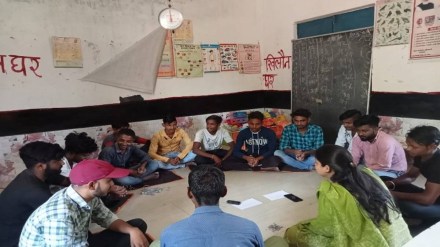By Karishma Vats
Home is the first learning platform for children, with parents being the first set of teachers. Children begin to learn some life skills, like emotional regulation, communication, or collaboration very early on, albeit depending on their surroundings. However, once these children enter into the formal education system, most of the impetus for learning falls entirely on the school and teachers with very little input from their parents. Nonetheless, parents continue to play a major role in their child’s life and their influence on the child increases as they enter their teenage years.
As children grow older and enter their teens, they often begin to spend a significant amount of their waking hours at school or being engaged in multiple activities outdoors but this does not discount the fact that homes continue to hold an intrinsic pull for them, shaping their beliefs and value systems and occasionally challenging what they learn outdoors. Therefore, greater awareness and acceptance by the parents and families are needed to integrate socio-emotional, cognitive, and academic aspects of learning. There are few skills that the youth learn or can learn from the parents and it can become the shared responsibility of the school and parents to teach life skills or support them to do so.
Empowering Parents as Key Partners in Nurturing Youth Life Skills in India
A recent survey conducted by Life Skills Collective in partnership with Breakthrough, Quest Alliance, and Pratham, titled “The Voices Survey” covering six states, including Uttar Pradesh, Haryana, Maharashtra, Mizoram, Rajasthan, and Uttarakhand, found that overall, 41% of youth had heard of the term Life Skill or 21st Century Skill. Of parents, 21% of mothers and 34% of fathers had heard of the life skills term. Parents might not have heard of specific life skill terms like problem-solving, relationship management, critical thinking, resilience, and decision-making but may be exercising every day in their lives in some way or the other. They can teach life skills to their children either through direct hands-on experience as well as by becoming role models for them. Structured workshops with parents on Life skills awareness can be enormously useful to help facilitate an honest and productive conversation with the parents eliciting their ideas and feedback on which life skills they see as most important and what it looks like to support youth’s development of these skills in the community and homes. By bringing parents’ voices to the table and validating their important role one can best work together with parents to support youth’s success in and out of school.
The Need for Increased Collaboration Between Teachers, Parents, and Schools in Shaping Youth Life Skills
The Voices Survey data further suggests that more than 90% of surveyed teachers had heard the term ‘life skill’. However, it also highlights that school teachers and trainers are nonetheless unclear about what life skills consist of, and therefore, about how they can be taught. When asked about whether life skills, vocational skills, and moral education are the same, 59% responded affirmatively suggesting confusion regarding what life skills entail. Another example is that most surveyed teachers believe that tangible skills (like cooking and cycling), intangible socio-emotional skills (like relationship management and coping with stress), soft skills, and moral education; all come under life skills.
Moreover, it is certainly unfair to believe that teachers or the school system alone shoulder all the responsibility of Life Skills Education. Schools influence youths’ lives for a relatively short duration of time, but home is more likely to be a permanent or long-lasting source of influence. There is a need for a robust intervention program that includes key strategies for teachers and schools to make Life Skills an integral part of the education system, and that includes parents to support it through concretely designed activities that could lead to a collaborative effort in this direction.
Bridging School and Home Initiatives Amplifies Youth’s Practical Application of Life Skills
When there is synchronization between the initiatives of schools and parents, consistent messages and support regarding the significance of life skills will be imparted to the youth. The involvement of both educational institutions and parents offers diverse opportunities for the practice and application of life skills in various contexts. Young individuals can apply the skills acquired at school in their home environment and vice versa, thereby strengthening their comprehension and practical application of life skills across different situations. The learning experience extends beyond the classroom curriculum, as youth also gain insights by observing the behavior of adults in their lives. This interconnection is pivotal in establishing positive examples.
(Karishma Vats is a Senior Research Associate at Pratham Education Foundation)
